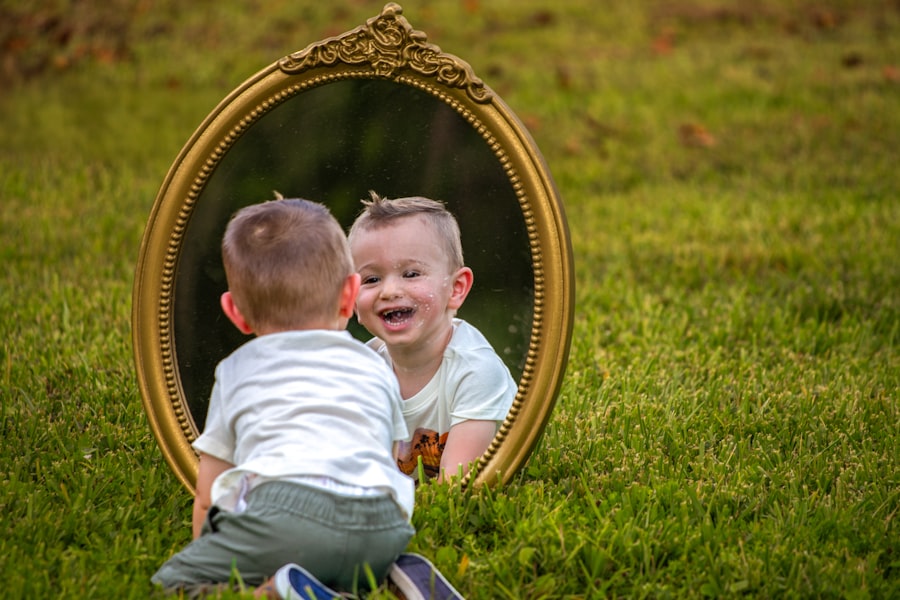Self-awareness is a cornerstone of personal development and emotional intelligence. It involves recognizing your thoughts, feelings, and behaviors and understanding how they influence your interactions with others and your overall well-being. When you cultivate self-awareness, you gain insight into your motivations and desires, which can lead to more intentional decision-making.
This heightened awareness allows you to navigate life’s challenges with greater clarity and purpose, ultimately enhancing your relationships and personal satisfaction. Moreover, self-awareness serves as a mirror reflecting your strengths and weaknesses. By acknowledging both, you can leverage your strengths to achieve your goals while actively working on areas that need improvement.
This process fosters a sense of accountability and encourages you to take ownership of your actions. As you become more attuned to your inner world, you will find that you can respond to situations with greater emotional regulation, leading to healthier interactions and a more fulfilling life.
Key Takeaways
- Self-awareness is crucial for personal growth and development.
- Recognizing emotions and triggers is essential for managing them effectively.
- Practicing mindfulness and reflection can help in understanding oneself better.
- Cultivating empathy and compassion towards oneself and others is important for healthy relationships.
- Embracing vulnerability and authenticity can lead to deeper connections with others.
Recognizing Emotions and Triggers
To develop self-awareness, it is essential to recognize your emotions and the triggers that elicit them. Emotions are powerful indicators of your internal state, and understanding them can provide valuable insights into your needs and desires. Take time to observe how you feel in various situations—whether it’s joy, anger, sadness, or anxiety—and consider what specific events or interactions provoke these feelings.
By identifying these triggers, you can begin to understand the underlying patterns in your emotional responses. Once you have a clearer picture of your emotional landscape, you can start to manage your reactions more effectively. For instance, if you notice that certain conversations consistently lead to feelings of frustration, you can prepare yourself for those interactions or even choose to approach them differently.
This proactive approach not only helps you maintain emotional balance but also empowers you to communicate your feelings more openly and constructively.
Practicing Mindfulness and Reflection

Mindfulness is a powerful tool for enhancing self-awareness. By practicing mindfulness, you learn to focus on the present moment without judgment. This practice encourages you to observe your thoughts and feelings as they arise, allowing you to gain insight into your habitual patterns of thinking and behaving.
Engaging in mindfulness exercises—such as meditation, deep breathing, or mindful walking—can help you cultivate a greater sense of awareness about yourself and your surroundings. In addition to mindfulness, reflection plays a crucial role in self-awareness. Taking time to reflect on your experiences allows you to process emotions and thoughts more deeply.
Consider keeping a journal where you can write about your daily experiences, feelings, and insights. This practice not only helps clarify your thoughts but also provides a record of your growth over time. By regularly reflecting on your experiences, you can identify recurring themes in your life and make more informed choices moving forward.
Cultivating Empathy and Compassion
| Metrics | 2019 | 2020 | 2021 |
|---|---|---|---|
| Empathy workshops conducted | 15 | 20 | 25 |
| Compassion training sessions | 10 | 12 | 15 |
| Number of participants | 200 | 250 | 300 |
| Impact assessment surveys | 50 | 60 | 70 |
Empathy is the ability to understand and share the feelings of others, while compassion goes a step further by motivating you to take action to alleviate their suffering. Cultivating empathy and compassion is essential for building meaningful connections with others and enhancing your self-awareness. When you practice empathy, you begin to see the world through the eyes of others, which can help you recognize how your actions impact those around you.
To develop empathy, actively listen when others speak and try to understand their perspectives without judgment. This practice not only strengthens your relationships but also deepens your understanding of human emotions. Compassion involves extending kindness not only to others but also to yourself.
Recognizing that everyone struggles at times can help you foster a more compassionate attitude toward yourself when facing challenges or setbacks.
Embracing Vulnerability and Authenticity
Embracing vulnerability is a vital aspect of self-awareness that allows you to connect with others on a deeper level. Vulnerability involves being open about your feelings, fears, and insecurities rather than hiding behind a facade of perfection. When you allow yourself to be vulnerable, you create space for authentic connections with others, fostering trust and understanding in your relationships.
Authenticity goes hand in hand with vulnerability; it means being true to yourself and expressing who you are without fear of judgment. When you embrace authenticity, you align your actions with your values and beliefs, leading to a more fulfilling life. This alignment not only enhances your self-awareness but also encourages others to be authentic in their interactions with you, creating an environment where genuine connections can flourish.
Identifying and Challenging Limiting Beliefs

Limiting beliefs are the negative thoughts or assumptions that hold you back from reaching your full potential. These beliefs often stem from past experiences or societal conditioning and can significantly impact your self-awareness and overall well-being. To cultivate self-awareness, it is crucial to identify these limiting beliefs and challenge their validity.
Start by paying attention to the negative self-talk that arises in various situations. Ask yourself whether these thoughts are based on facts or assumptions. Often, you’ll find that these beliefs are unfounded or exaggerated.
By reframing these thoughts into more positive affirmations, you can shift your mindset and open yourself up to new possibilities. This process not only enhances your self-awareness but also empowers you to pursue goals that align with your true potential.
Developing Healthy Coping Mechanisms
Life is filled with stressors and challenges that can impact your emotional well-being. Developing healthy coping mechanisms is essential for managing these stressors effectively while maintaining self-awareness. Instead of resorting to unhealthy habits such as excessive drinking or avoidance behaviors, focus on cultivating positive coping strategies that promote resilience.
Consider engaging in activities that bring you joy or relaxation, such as exercise, art, or spending time in nature. These activities not only provide an outlet for stress but also enhance your self-awareness by allowing you to connect with yourself on a deeper level. Additionally, practicing self-care routines—such as getting enough sleep, eating well, and setting aside time for relaxation—can significantly improve your ability to cope with life’s challenges.
Seeking Support and Feedback
No one navigates life alone; seeking support from others is an essential aspect of personal growth and self-awareness. Surrounding yourself with supportive friends, family members, or mentors can provide valuable perspectives on your experiences and behaviors. Engaging in open conversations about your feelings and challenges can help you gain insights that may be difficult to see on your own.
Feedback is another powerful tool for enhancing self-awareness. When others provide constructive criticism or observations about your behavior, it offers an opportunity for growth. Be open to receiving feedback without becoming defensive; instead, view it as a chance to learn more about yourself and how others perceive you.
This willingness to listen can lead to profound insights that contribute to your personal development journey.
Setting Boundaries and Prioritizing Self-Care
Setting boundaries is crucial for maintaining healthy relationships and protecting your emotional well-being. When you establish clear boundaries regarding what is acceptable behavior from others, you create a space where you can thrive without feeling overwhelmed or taken advantage of. This practice requires self-awareness; understanding your limits allows you to communicate them effectively.
Prioritizing self-care is equally important in this process. Self-care involves taking intentional actions that nurture your physical, emotional, and mental health. Whether it’s dedicating time for hobbies, practicing relaxation techniques, or simply saying no when you’re feeling overwhelmed, prioritizing self-care reinforces the importance of valuing yourself.
By setting boundaries and engaging in self-care practices, you’ll find that you’re better equipped to handle life’s challenges while maintaining a strong sense of self-awareness.
Embracing Personal Growth and Evolution
Personal growth is an ongoing journey that requires commitment and openness to change. Embracing this journey means recognizing that self-awareness is not a destination but rather a continuous process of learning about yourself. As you evolve through different life stages and experiences, your understanding of yourself will deepen.
To foster personal growth, set specific goals that challenge you while remaining attainable. These goals can be related to various aspects of life—career aspirations, relationship improvements, or personal interests. As you work toward these goals, regularly assess your progress and reflect on what you’ve learned about yourself along the way.
This commitment to growth not only enhances self-awareness but also enriches your life experience.
Integrating Self-Awareness into Daily Life
Integrating self-awareness into your daily life requires consistent effort and practice. Start by incorporating small moments of reflection throughout your day—whether it’s pausing for a few deep breaths before responding in a conversation or taking time at the end of the day to reflect on what went well and what could be improved.
Additionally, consider creating rituals that promote self-awareness as part of your routine. This could include morning affirmations, gratitude journaling, or evening reflections on the day’s events. By making self-awareness a priority in your daily life, you’ll find that it becomes second nature over time.
Ultimately, this integration will lead to greater emotional intelligence, improved relationships, and a more fulfilling life overall. In conclusion, cultivating self-awareness is an essential journey that enriches every aspect of your life. By recognizing emotions and triggers, practicing mindfulness, embracing vulnerability, challenging limiting beliefs, developing healthy coping mechanisms, seeking support, setting boundaries, prioritizing self-care, embracing personal growth, and integrating these practices into daily life, you’ll unlock the potential for profound transformation within yourself.
As you embark on this journey toward greater self-awareness, remember that it is a continuous process—one that will lead you toward deeper connections with yourself and others while fostering a more fulfilling existence.
In the journey of self-awareness and emotional growth, understanding the intricate dynamics of our emotions plays a crucial role. An insightful article that delves into this topic can be found on Unplugged Psychology’s website. This piece explores the various facets of emotional intelligence and how it contributes to personal development. For a deeper understanding, you can read more about it in the article available at Unplugged Psychology.
WATCH NOW! 😔 The Hidden Cost of Forced Positivity
FAQs
What is self-awareness?
Self-awareness is the ability to recognize and understand one’s own thoughts, feelings, and behaviors. It involves being conscious of how you perceive yourself and how others perceive you.
Why is self-awareness important for emotional growth?
Self-awareness is important for emotional growth because it allows individuals to identify and understand their emotions, which in turn helps them to manage and regulate their feelings. It also enables individuals to develop a deeper understanding of their own needs and values, leading to personal growth and development.
How can self-awareness contribute to better relationships?
Self-awareness can contribute to better relationships by helping individuals to communicate more effectively, understand their own triggers and reactions, and empathize with others. It also allows individuals to set healthy boundaries and take responsibility for their own actions, which can lead to more fulfilling and harmonious relationships.
What are some strategies for developing self-awareness?
Some strategies for developing self-awareness include mindfulness practices, journaling, seeking feedback from others, and engaging in self-reflection. Therapy and counseling can also be helpful for gaining insight into one’s thoughts and emotions.
How does self-awareness impact personal and professional success?
Self-awareness can impact personal and professional success by enhancing decision-making abilities, improving communication skills, and fostering a greater sense of empathy and understanding. It can also lead to increased confidence and resilience in the face of challenges.




